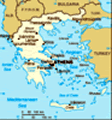Advertisement
Published: September 21st 2006

 Cultured Ottoman
Cultured Ottoman
The Mosque of Suleyman in the Old Town of RhodesA perturbed Athenian quenched his divulgence. He chose me and filled my carefree mind, causing the strange restlessness of a pilgrim whom sets his first steps upon a long, unending journey. Like Ulysses’ banishment from home by angered Poseidon, I was on another island, the island of Rhodes, and the restlessness came surging in a torrent of tides.
Another languid day of exploration had passed when it struck full force, and I was then on the town beach taking my evening bath. The sun was setting, west below the island of Symi and the exotic land of Turkey. And like Ulysses, this restlessness grew, springing forthwith from the churning waters of the directional soul.
Passing Rhodes The day had been uneventful; a ferry the evening prior from Karpathos, the sleep and enjoyment in a first of beds in over one week, and the wandering through the Old Town of Rhodes on the island’s most northern spit. Being the largest inhabited medieval town in Europe, packages and large consuming cargos of tourists flocked to the center like untamed sheep on a farmer’s tailored crops.
Indeed, the buttresses and fortification walls enclosing the narrow, cobble-swept alleys were impressive, but one day

 Burgeoning Corral
Burgeoning Corral
Yes, the beach of Rhodes Town. Scary!was enough to handle the touts and the slow, creeping foreigners gawking at the rows of shops where products tumultuously spilled from their stone doorsteps. These jewels of merchandise ornamented the shop’s façade and added its constricted property onto the walkway. Hangers and stands spun in the stirring air currents. They flashed like a lure in the depths of a crystal pond. Space was already limited in the design of the Old Town, and the flood of goods didn’t help keep the pedestrianized traffic flowing.
Heat and sweat perspired from my body as I navigated the masses as a vessel through a maze of shallow coral. Winding and dwindling behind wide loads of English, Germans, Dutch, Japanese, Italians, French, Scandinavians and Americans hauling their plastic bags of souvenirs stopping abruptly to indulge their trade or pose for photos, brought a tiresome and weary feat of navigational stress upon mind and body. And relief only came when the opening expanse of the sea brought clarity to the senses. I dipped into the refreshing seas. Still, only stirred by the passing ferries carrying passengers to the surrounding islands and Marmaris, Turkey, the water was a perfect pastel blue. Underneath its surface,

 Enter The Fallen Collosus
Enter The Fallen Collosus
Deer marking the entrance of Mandraki Harbor where it was believed the Collosus of Rhodes once stood at a height of 32msalt flushed my eyes. Sand was washed from my scalp. My skin was moistened. I hailed the benefits of the sea as Poseidon washed over me.
Far From Athens With the quenched experience of a swim, equal to slipping out from the day’s feet spent within the braces of hiking boots, or rising from a massage anointed in ambrosial oils and handfed a selection of seasonal grapes popping under tooth, the cultural divulging rejuvenated my island-bound astuteness.
His name was John, an Athenian come to alleviate his tension upon a rigid Greek society. With undue pertinence, John confessed this disgrace of his culture, pointing to the uninspiring blocks of concrete labeled with neon hotel brands. They lined the beachfront and opened their doors to the rush of holiday-seekers in search of pampering service and the corral of umbrellas and lounge chairs.
“After all the ancients, we have fallen from a classic society to build an artless culture.” What John admired was America, and it enthralled him once we exchanged our greetings.
Although most of the world doesn’t see it today, nor do they respect it, American culture (
culture, not the political or governmental state) has the

 Practicing Pidgeon
Practicing Pidgeon
Despite the bottles and bottles of plastic water drunk by tourists, the tap water is fresh and free. Highly recommended for morale and budgetbrightest minds with the simplest, most open-ended outlook.
“All Americans are this way; simple people with open minds. They see many things from all world’s civilizations and…and… What is it?” John paused looking down at the pebbly shore from which he stood. “Yes! They absorb it. They mix it with their own, taking the good and some bad and making it their own. I think maybe, not today, but in fifty years, Americans will let this knowledge spread to the rest of the world.”
What kept Greece behind with the rest of Europe was tradition. John confessed that their conservative perspectives to life and their resistance to change were like an anvil strapped to their feet. “Greece doesn’t look to themselves. Greece looks to the U.S. and shames them. They blame America the government. This finger-pointing doesn’t help with the change they need themselves even though they wish to be open, free and happy like American culture.”
John went off to list the foretelling statistics of Grecian lifestyle. The minimum average of watched television per day was hovering around 3 ½ hours, while fewer partook in the enjoyment of reading. Music, theatre, visiting museums and the studying

 Hora Narrows
Hora Narrows
The Old Town is divided into three quarters; the Knight's Quarter, the Hora (or Turkish Quarter) and the Jewish Quarter.and appreciation of the arts were becoming less and less important in their daily lives.
“See,” he remarked, “What music is most popular in the world?”
“American,” we joined in unison.
John went on. “Yes, because in America—music, theatre, art, literature—they put soul into it. They express their emotions, their feelings. It’s their daily life! All this is most important to them as it should be to everyone.”
I added the conclusive word
passion. Passion is readily expressed and available in American society.
A Drive For the Living Passion: An inner lust for feeling, for being, for experiencing the very thing we are here to do. And passion was not a given birthright during parturition among the first of mankind. It evolved and it continues to evolve in the face of pain and suffering, wars and poverty; in the face of love, the breaking of walls between man and woman, black and white; in the face of the revolutionary species known as
Homo sapiens.
Passion germinated within the soul as survival and its necessity became less and less of a day-to-day ritual. It was overtaken by the advanced necessity to learn no longer

 Where am I?
Where am I?
Is this suppose to be Greece? Beachfront; Rhodeshow to live life, but how to enjoy life. The ancient Greeks knew this. Passion was represented in their arts. The classical era, the birth of democracy, the arts of architecture, sculpture, pottery, theatre, literature and philosophizing all portrayed a lust for life, the beauty they partook of it paralleling with the mechanisms of war for survival. Passion and survival became the ancient Grecian culture, and today, within the depths of American culture passion can be found brewing from the soul it was made to express from. Thought, on the surface there still lingers a
need for survival.
John was on Rhodes for two weeks. He was tired of Athens. He was tired of his work, the miasmic turns of the city, tired of the tension he was feeling about life. So, he quit. Picking up and leaving, he took a holiday to a place he once visited in 1982 as a child. “When I first saw this place—the Palace of the Grand Masters, the walls, the churches and mosques—I thought, ‘Wow! It’s unbelievable!’”
Twenty-four years ago, few of the now-littered concrete blocks lining the beachfront were yet established. John wanted to return to that center of awe he

 A Man and His Roller
A Man and His Roller
The bow of a ferry before heading off to Marmaris, Turkeyfelt in his youth and let the present tension go. He wanted that passion, that pride, that respect for life again. The flame was dying. John was to be rejuvenated in the seas.
And that’s what John would do. He told me he liked to read. He liked to relax and sit quietly during a time of endless self-responsibility without people calling on him. This was to be John of Athens’s holiday. And within the two-week timeframe, he had a lot to think about, sift through and let go.
The Lives Between Two Passions On an opposite end, while John prepared to sit and sink into the sunny shores of Rhodes, I was suddenly overtaken by that very drive of passion. Rhodes, in reality, is Europe’s Mazatlan or Puerto Vallarta. And already, I had nearly three weeks of the lines of tourist shops with faded photos of plates of food available on a sign alongside the roads.
This idyllic portrayal of traveling beach to beach, boat by boat, through seaside town to some touristy economy lost its appeal. It grew weary and boring as I thought of more island hopping, skipping north to Tilos, Nisyros, Patmos and Chios,

 Ancient Reflections
Ancient Reflections
Yes, the schoolroom pictures have become 3D. The Parthenon, Athens.onward to Lesvos and some other barren, hot, sultry sand-circumnavigated destination with sun and more sun. Already, I had achieved a tan bum, which not until now did I know had always been a goal of mine. Check that off the list.
Now, with the sand washed off my brain, there was something deeper, something in need of tending to. It arose as restlessness. It was transformed into inspiration, into intelligence, into a dormant astuteness for a culture that birthed the very world I’m most familiar with. John lit a fire of curiosity far from the shores of a place like Rhodes, or Ulysses’ captor’s islet, or say the nudist beach of Plakias on Crete. John of Athens spoke of Athens, the center of Grecian culture. I myself had to experience what John sought to rekindle. We traded lifestyles, and as he laid out his towel and brought out his book, I strapped my pack to my back and boarded a ferry to the ancient cultural center of Greece, Europe’s oldest city, Athens.
Advertisement
Tot: 0.093s; Tpl: 0.013s; cc: 8; qc: 24; dbt: 0.0528s; 1; m:domysql w:travelblog (10.17.0.13); sld: 1;
; mem: 1.1mb













